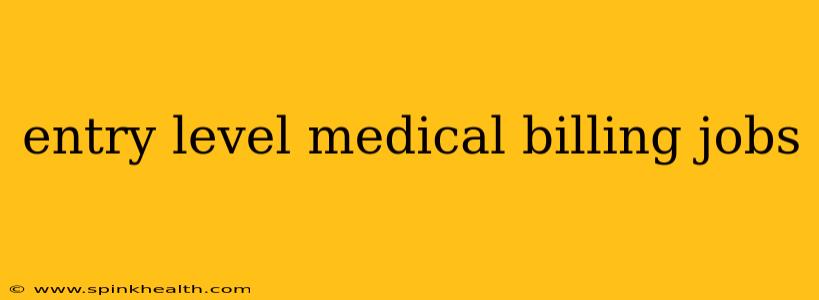The world of healthcare is vast and complex, but behind the scenes, a crucial cog keeps everything running smoothly: medical billing. This isn't just about sending out invoices; it's about navigating intricate insurance systems, ensuring accurate coding, and ultimately, getting healthcare providers paid. If you're detail-oriented, have a knack for numbers, and are intrigued by the healthcare industry, an entry-level medical billing job could be your perfect launchpad. But where do you start? Let's unravel the mystery.
My name is Sarah, and I've been working in medical billing for over ten years, starting just like you – at the entry level. I've seen the industry evolve, and I understand the hurdles and triumphs involved. This guide is based on my firsthand experience and aims to equip you with the knowledge you need to land your dream job.
What Does an Entry-Level Medical Billing Specialist Do?
Think of entry-level medical billing as an apprenticeship. You'll be learning the ropes, mastering the basics, and working alongside experienced professionals. Your daily tasks might include:
- Data entry: Accurately entering patient information, insurance details, and procedure codes into billing software. This is where precision is paramount – a single misplaced digit can delay payment.
- Coding: Learning and applying medical codes (CPT, ICD-10, HCPCS) to accurately reflect the services provided by doctors and other healthcare professionals. This requires attention to detail and a willingness to learn complex medical terminology.
- Claims submission: Submitting claims electronically to insurance companies. You’ll learn various electronic health record (EHR) systems and billing platforms.
- Claims follow-up: Tracking the status of submitted claims, investigating denials, and resubmitting claims as needed. This often involves communicating with insurance providers, which necessitates clear and professional communication skills.
- Generating reports: Creating reports on billing metrics, helping the office track revenue and identify areas for improvement.
This isn't just about pushing numbers; it's about ensuring patients receive their bills accurately and that healthcare providers are compensated fairly for their services.
What Skills Do I Need for an Entry-Level Medical Billing Job?
While formal education is beneficial, many entry-level positions prioritize these essential skills:
- Strong attention to detail: Accuracy is non-negotiable. A single mistake can lead to delayed payments or even denied claims.
- Proficiency in Microsoft Office Suite: You’ll likely be using Excel, Word, and potentially other programs for data management and reporting.
- Data entry skills: The ability to input data quickly and accurately is crucial.
- Understanding of medical terminology: While you don't need to be a doctor, familiarity with medical terms and procedures is a huge advantage.
- Excellent communication skills: You'll be communicating with patients, insurance providers, and colleagues. Clear and professional communication is key.
- Problem-solving skills: You'll encounter issues with claims, coding, and insurance companies. Being able to identify and solve problems efficiently is essential.
- Basic understanding of medical billing and coding (Optional but helpful): A basic understanding of medical billing principles can give you an edge.
What Education or Training is Required for Entry-Level Medical Billing Jobs?
While a college degree isn't always a requirement, many employers prefer candidates with some level of education or training. These options can significantly boost your chances:
- Associate's Degree in Medical Billing and Coding: This provides a solid foundation in billing practices, coding systems, and insurance regulations.
- Medical Billing and Coding Certificate Programs: These shorter programs focus specifically on billing and coding skills, offering a quicker path to entry-level employment.
- On-the-job training: Some employers provide on-the-job training, but having prior knowledge will make you a more competitive candidate.
What is the Salary Range for Entry-Level Medical Billing Jobs?
Salary varies greatly depending on location, experience, and employer. However, you can generally expect an entry-level salary ranging from $30,000 to $45,000 annually. This can increase significantly with experience and specialized certifications.
How Can I Find Entry-Level Medical Billing Jobs?
Several avenues can lead you to your first medical billing role:
- Job boards: Sites like Indeed, LinkedIn, and Monster often list medical billing openings.
- Healthcare staffing agencies: These agencies specialize in placing healthcare professionals, including medical billers.
- Networking: Attend healthcare industry events and connect with professionals in the field.
- Company websites: Check the careers pages of hospitals, clinics, and medical practices directly.
What are the Career Advancement Opportunities in Medical Billing?
This isn't a dead-end job. With experience and further training, you can advance to roles like:
- Senior Medical Biller: Supervising junior billers and taking on more complex tasks.
- Medical Billing Manager: Overseeing the entire billing department.
- Medical Coding Specialist: Focusing on accurate coding and compliance.
- Revenue Cycle Specialist: Working to optimize the entire revenue cycle process.
The journey starts with that first step. Remember to highlight your skills, be prepared to learn, and showcase your dedication to accuracy. The world of medical billing awaits!

